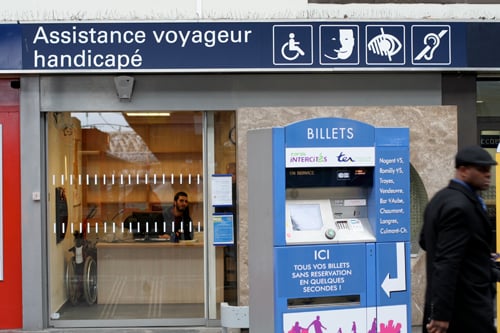Accessible Travel Tips For Paris

If you’re coming to Paris and have special needs, such as access for a wheelchair, here is a list of resources that will help you plan your trip. Please note that I haven’t used many of these services, especially the tour operators, so ask as many questions of them in advance as you need to get the most information about the services they offer before you sign on.
Paris is a very old city and although new construction includes access for wheelchairs, the older buildings and narrow sidewalks aren’t always easy to navigate. However, over the past few years, there’s been a heightened increase in services to assist those with mobility issues. Below I’ve put together this list of websites and services that I hope will help. If you have limited time and want to make the most of your trip, hiring a guide or at least a van for the day may allow you to see more than trying to use public transit, and the additional expense might be mitigated by the convenience.
Please note that I first wrote this post in 2008 and some things may have changed. I’ve tried to update it over the years but apologies if any of the links are out of date.

A few things to remember:
- In many instances, if there is an elevator in a métro or train station, it may not be functional. Give yourself plenty of extra time when moving about Paris.
- All stops on the métro line 14 are accessible. (Each station has an elevator but as mentioned above, give yourself extra time in case they aren’t in service.) None of the other métro lines are accessible and there are a number of stairs in the underground stations to contend with but 63 stations on RER lines A and B are equipped with elevators and wide-access gates at the ticket gates, as well as special training for staff accompanying persons with reduced mobility. You can find all the info on RATP accessibility here.
- All of the Paris bus lines are accessible. Buses run frequently in Paris and are a great way to get around. You’ll find people helpful, as Parisians do yield to wheelchairs and people of various physical abilities.
- Because Paris is old, many of the buildings aren’t easily accessible, which is changing as buildings are restored. Still, neighborhoods like the Marais are tight and may pose a challenge. Don’t be discouraged: Parisians are reserved but are quite helpful when called into duty. People who are frail, elderly, or have special needs, are usually treated with extra respect.
- Spaces in restaurants and shops may be tighter than what you’re used to, but bear in mind that if you go during busy hours, you may not be as comfortable as if you dine at off-hours. When you make a reservation, let them know in advance you might need special assistance. Have the desk person at your hotel call first so they can reserve a table or space that’s easier to navigate. And in the summer, you may wish to dine en terrasse (outside), which is more spacious.
- For foodies, one interesting area to explore is the Place de la Madeleine which is flat and the sidewalks are wide. There you’ll find fine food shops clustered around the area to explore. Most of the shops are accessible. The rue Montorgueil is also excellent for exploration and is less-upscale.
- Sites & Resources for Accessible Travel In ParisPlease note that a few of these websites are in French. In France, information and services are subject to change without notice so even if an official site says something is available, it’s best to confirm beforehand if you can. Some of the official French sites have an English-language version. You can also use a website translator, such as Google Translate.
- Tourism et Handicap (in French) is a website aimed at providing accessibility information.
- Access Plus: This SNCF official service will assist people in wheelchairs, and you’ll be met at the train station by a representative who will assist you with all your arrangements. (The SNCF has a more complete site with information about accessibility.)
- Disneyland Access Guide: Guide to getting around the Magic Kingdom, just outside of Paris.
- J’accede: List of accessible restaurants, sporting facilities, attractions, and museums across France.
- Disabled Access in Paris: Personal website with accessibility information.
- City of Paris: Information from Paris Tourism Office including lists of accessible monuments museums, and services. Use the search engine to find the most up-to-date information.
- Château de Versailles has accessibility information (scroll down to find the options).
- G7 Taxi: Call in advance to arrange wheelchair access taxi. They have an English-Speaking number and take reservations online, too.
- Paris On Wheels: Accessible tours of Paris.
- Wheel Adventures
Personal website offering budget travel tips for wheelchair travelers. - Access Tourism: Accessible French travel agent.
- Access Project Paris: Lots of tips about traveling to and from, and within Paris
- Rick Steve’s Easy Access Europe Guide: The travel guru’s guide to European accessible travel.
- Mobile en Ville:Tips for getting around Paris. (In French)
- Association des Paralysés de France: Association for those paralyzed. (In French)
- Wheeliz: Wheelchair accessible rental vehicles from individuals and professionals.
- My Paris Travel Tips – Favorite restaurants and bakeries and chocolate shops in Paris














